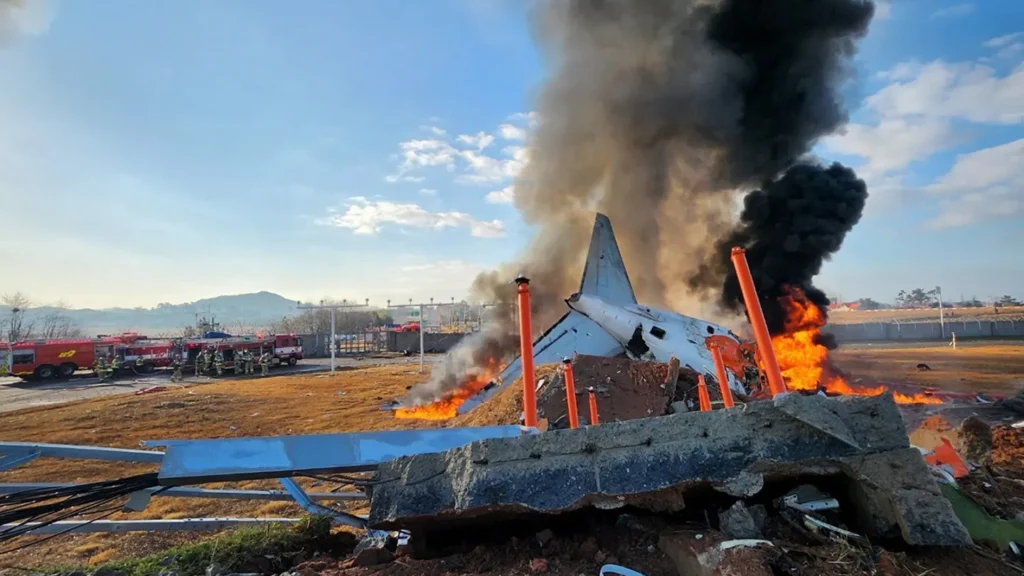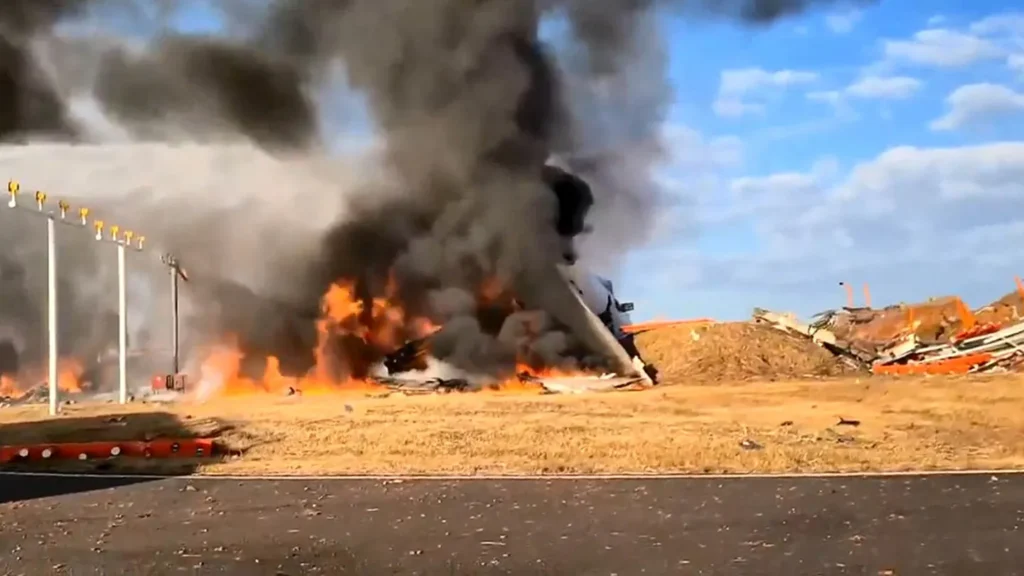Jeju Crash: Tragedy Strikes South Korea, 167 Lost
South Korea in Mourning: Jeju Air Plane Skids Off Runway at Muan Airport, 167 Tragically Killed, 2 Critically Injured

On Sunday, December 29, 2024, a tragic aviation disaster unfolded at Muan International Airport in South Korea. A Jeju Air Boeing 737-800, arriving from Bangkok, Thailand, skidded off the runway during landing and crashed. Of the 175 passengers and six crew members on board, 167 lost their lives, making this one of the deadliest aviation accidents in South Korea’s history.
Two survivors were rescued but remain in critical condition. In response, the President has directed immediate aid to victims and their families, while ordering a comprehensive investigation into the incident. Preliminary findings point to a potential landing gear malfunction, possibly compounded by a bird strike. Investigators are working to confirm the exact cause of the crash.
Muan, South Korea – December 29, 2024, has been etched in black letters in the history of South Korea. On this day, a Jeju Air passenger plane met with a horrific accident at Muan International Airport, claiming the lives of 167 people.
Sequence of Events at Muan International Airport
On the morning of Sunday, December 29, 2024, Jeju Air Flight 737-800, after departing from Suvarnabhumi Airport in Bangkok, Thailand, arrived at Muan International Airport in South Korea.
Passenger and Crew Demographics
The aircraft was carrying a total of 181 people – 175 passengers and 6 crew members.
Rescue Operation and Casualty Count
Immediately after the accident, the National Fire Agency (NFA) and the airport’s emergency teams were mobilized. 32 fire trucks and 80 personnel were dispatched to the scene. Rescue teams made every effort to extract those trapped amidst the flames and smoke.
This heartbreaking accident resulted in the deaths of 167 people. Only two individuals, one passenger and one crew member, were rescued alive. They sustained serious injuries and were immediately rushed to a nearby hospital, where their condition remains critical.
The exact causes of the accident are under intense investigation. However, preliminary investigations have pointed to some potential factors

Landing Gear Malfunction
Initial investigations reveal that the aircraft’s front landing gear failed to deploy. The landing gear is one of the most crucial components of an aircraft, essential for a safe landing.
According to the Yonhap News Agency, a bird strike is also being considered as a potential cause in the initial investigation. If a bird collides with the engine or other critical parts of the aircraft, it can cause severe damage and affect the plane’s control. However, it has not yet been confirmed whether a bird actually collided with the aircraft.
he possibility of human error, pilot fatigue, or a technical glitch cannot be ruled out as contributing factors to the accident.
3. Investigation Process
South Korea’s Ministry of Land, Infrastructure, and Transport (MOLIT) has ordered a thorough investigation into the accident.
Boeing, the aircraft manufacturer, has also offered to cooperate in the investigation.
Black Box Data
The aircraft’s black box, which includes the Flight Data Recorder (FDR) and Cockpit Voice Recorder (CVR), has been recovered. The FDR records the aircraft’s speed, altitude, direction, and other critical data, while the CVR records conversations and other sounds in the cockpit. The data retrieved from these recorders will play a crucial role in determining the causes of the accident.
South Korean Government’s Response
South Korea’s Acting President, Choi Sang-mok, expressed deep sorrow over this horrific accident. He visited the crash site on December 29, 2024, and reviewed the relief and rescue operations. He expressed his deepest condolences to the families of the victims and promised to provide them with all possible assistance
Thai Government’s
Thailand’s Prime Minister, Paetongtarn Shinawatra, also expressed deep শোক over this incident.
Jeju Air Accident: Official Statement and Key Details
Jeju Air’s Response to the Tragic Accident
Jeju Air has issued an official statement expressing profound sorrow over the recent accident. The airline extended heartfelt apologies to the families of the victims, pledging full support and assistance during this difficult time. The incident marks the first fatal accident in Jeju Air’s history, leaving the company and its staff deeply shocked and committed to ensuring safety moving forward.
Boeing’s Commitment to Support
Boeing, the manufacturer of the aircraft involved, also conveyed its condolences. The company emphasized its readiness to cooperate fully with the ongoing investigation and provide technical assistance to uncover the cause of the accident.
About Jeju Air
Jeju Air, founded in 2005, is one of South Korea’s leading low-cost carriers. The airline operates a robust network of domestic and international routes, earning a reputation for affordable fares and reliable service.
The Boeing 737-800: An Overview
The Boeing 737-800, part of the Next Generation 737 family, is a widely used twin-engine, narrow-body aircraft designed for short to medium-haul flights. Renowned for its versatility and efficiency, it remains one of the best-selling commercial airplanes globally.
Safety Record of South Korean Aviation
South Korea’s aviation industry is recognized for maintaining a strong safety record, driven by stringent regulations and regular safety audits. However, isolated incidents have raised questions about the effectiveness of these measures.
Previous Aviation Incidents
While the industry has been largely safe, notable accidents have occurred:
- Korean Air Flight 801 (1997): Crashed in Guam, resulting in 228 fatalities.
- Asiana Airlines Flight 214 (2013): Crash landing in San Francisco, causing three deaths.
Impact of the Jeju Air Crash
The recent Jeju Air accident has reignited concerns about aviation safety in South Korea. The incident is expected to prompt the government and regulatory bodies to re-evaluate and reinforce safety measures.
Steps Forward for South Korean Aviation
1. Transparent Investigation
A comprehensive investigation is crucial to identify the root causes. Authorities must ensure transparency to maintain public trust.
2. Strengthening Safety Standards
The government should review and tighten aviation safety protocols, addressing potential gaps highlighted by this incident.
3. Supporting Victims’ Families
Providing adequate support and compensation to the victims’ families is essential to show accountability and compassion.
4. Restoring Public Confidence
Concrete steps, including safety reforms and enhanced oversight, are needed to rebuild trust in South Korea’s aviation sector.
Key Investigation Areas
Aircraft Maintenance and Pilot Training
- Maintenance Records: Investigators will scrutinize the aircraft’s maintenance history for technical issues.
- Pilot Training and Experience: A detailed review of the pilot’s credentials and training will determine readiness to operate the aircraft.
Air Traffic Control and Weather Conditions
- ATC Communication: The role of air traffic control in the incident will be evaluated.
- Weather Conditions: Despite clear weather at the time of the accident, environmental factors remain under review.
Jeju Air’s Safety Record and Industry Impact
Jeju Air, previously noted for its reliable operations, faces its first fatal accident. This incident could lead to stricter industry regulations and a decline in passenger confidence, potentially affecting the broader South Korean aviation landscape.
International Aviation Community’s Response
The global aviation community has expressed condolences and pledged support in the investigation, underscoring shared safety concerns.
The Jeju Air crash is a somber reminder of the critical importance of aviation safety. As investigations proceed, it is vital to implement lessons learned to prevent future tragedies. This incident serves as a turning point for South Korea’s aviation industry, emphasizing the need for continual improvement in safety standards.
Stay informed, stay aware. For the latest insights on global trends and stories that matter, visit Trendsnip—your trusted source for breaking news and in-depth analysis.
About the Author
Michael
Administrator
Michael David is a visionary AI content creator and proud Cambridge University graduate, known for blending sharp storytelling with cutting-edge technology. His talent lies in crafting compelling, insight-driven narratives that resonate with global audiences.With expertise in tech writing, content strategy, and brand storytelling, Michael partners with forward-thinking companies to shape powerful digital identities. Always ahead of the curve, he delivers high-impact content that not only informs but inspires.



